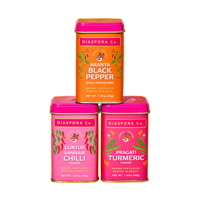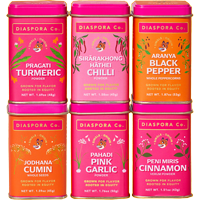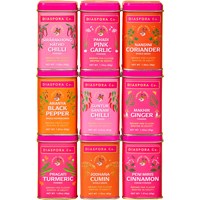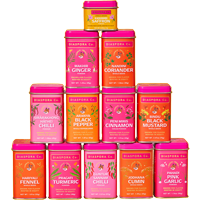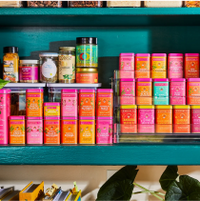Ahead of the pepper harvest later this winter, we sat down for a conversation with our farm partner Akash of the Parameswaran family farm, where our Aranya Black and White Pepper grow alongside coffee and areca nut, or betel nut. Our Aranya Pepper is widely beloved. Complex and deep like nice wine, and with a fruity heat in the back, our Aranya Black Pepper is a reminder of what pepper should taste like.
Akash’s family has owned the farm for 40 years, and Akash himself, 30 years old, has been born and raised on the farm, leaving only to get his MBA and returning as soon as he could to dedicate his life to the farm. Since then, Akash has spent the past eight years learning from his father about pepper farming on a daily basis. Each morning, he and his parents keep alive the long-standing tradition of starting each day with a family walk around the farm, something they have been doing since Akash was a child.
“I was brought up on the farm since childhood and it has been my only world ever since,” Akash said to our team. “I always wanted to come back to the farm and help my father. I always tried to find reasons to stop education to join him sooner.”
But life on the farm has changed drastically in recent years as our farm partners battle climate change, including rising temperatures and too much rainfall. We sat down with Akash to learn about what a day on the farm looks like, how climate change has affected them, and how they’ve been coping.
This interview has been edited and condensed for clarity.
![]()
Virali: It’s so nice to meet you. How are you doing? How was your day?
Akash: It's going good. I was just busy on the farm.
Virali: Oh, nice. What does a typical day look like for you?
Akash: So it's probably like 10 to 12 hours on the farm starting around 7, 7:30am. My parents and I start our day one hour before the farm workers show up to walk around, check the cows, and make sure that things are happening well on the cattle farm.
Around eight o'clock the workers come. They all belong to the local tribal community and they live around our farm. Everyone begins working around then till ten o'clock, when there's an almost one-hour break. Then everyone works till one o'clock. And then again, that's the lunch break. And until 4:30 we have work happening on the farm. And that's Monday till Saturday.
But it's not required that the farm workers have to come every day. They can come whenever they want, unlike a corporate job wherein you have to show up on a certain day and you have to have a certain time of attendance. They can go on a leave for several weeks, even several months.
Virali: What was it like growing up on a farm? What is it like living on the farm today?
Akash: Growing up on the farm was absolutely nothing special to me until I moved out of the farm for better education. I instantly realised that the world outside is simply much much more chaotic and in a hurry. This is when I started looking at opportunities to come back and live on the farm.
Today, I can’t think of doing anything else. I will never stop what I am doing no matter the challenges. I love what I do today, thanks to my parents.
Virali: Could you tell us a little bit about working on the farm with your parents?
Akash: My dad and I do everything from selecting the vines that we develop more plants from, to harvesting the plants. He trains me on how to treat the workers as much as he trains me about plants. Once the plants are harvested, it is me and my mom who look after them. However, as I mentioned, all of us walk through the farm every single day, in the mornings and in the evenings after work hours to plan and assess things for the next day.
It would have taken me another 30 years or more to acquire the same level of knowledge that I have been able to get access to, if it wasn’t my parents who were mentoring me. They started from scratch. They bought this piece of land which was wholly paddy-cultivated land. And they have had numerous failures and years with absolutely no income from the farm.
Virali: On a different note, what is your favorite food? What is your favorite part of the job?
Akash: Fresh green pepper sardine is my favourite food.
And about the job, it is that freedom that I get to innovate farming, not having to deal with the over-civilised world, and having to only deal with a few good people in the tribal village who are fun to work with. I also learn from them about farming and of the different plants and practices they have been following. We go trekking to places deep inside the forests to where only they know the way.
Virali: Is there a day of the year on the farm that's your favorite? Maybe a festival or special day / season?
Akash: Yes! There’s a day, usually when there’s less work on the farm and most of the farm workers are present in the village, when we all have a small gathering. We cook biryani, sing, and dance.
Also before COVID, we took everybody to any one city or amusement park, or even to look at airplanes, which many folks have never seen before.
Virali: Could you explain a little bit about the life cycle of the pepper plant? How old are these pepper plants?
Akash: Every year, we plant new pepper plants and get rid of about 5% of existing plants, even those that are technically a “good crop.” If we think that something has hit a plant — some kind of fungus or some pest — we just have to rip the pepper vine off the tree or off the ground very carefully so that it doesn't fall or touch other plants, and then we burn it.
Sometimes people consider this process to be a waste of time or money, because it takes 3-5 years for a pepper plant to become that size. It takes a lot of time and effort, but getting rid of certain plants does help us a lot in maintaining quality. But what that means is we have to replant and replace those every year.
On an average, our pepper plants are about eight years old. But a good vine can last up to 20 years.
Virali: Are you expecting this harvest season to be a good one?
Akash: Average. A very good harvest is always very bad for the coming year. So we always like to keep it average.
A really good harvest happens when the weather is unreasonably favorable. And that has not been the case for the past 10 years, is what my dad says. So previously, when the weather was more favorable, we didn't have to artificially irrigate anything. We just had to make sure that no wild animals came, ate them up, or did any damage. So that was the only threat back then. The plant cycle was completely taken care of by nature itself.
When a good harvest happens, there is no rain during that harvest season. So the sun is very bright and we can get it right without any obstacles.
But what happens now is it doesn't rain when the crop needs it. It actually rains when the crop flowers sometimes. Whether it be pepper or coffee, there shouldn't be rain when the flower is at blossom. In short, everything is not as it used to be due to climate change.
So we have to take other measures and artificially irrigate, for example.
Virali: How are you experiencing climate change on the farm? How is it showing up and how are you dealing with it?
Akash: Very bad. Very, very bad. Yeah. Just like any farmer would say, that is the worst thing and on an average, I think it's getting 10% harder every year to maintain the farm, only because of climate change.
And we are on the lucky side to a very great extent. We are on the lucky side because the land itself where we are based is not at all exploited. And luckily we fall in a biosphere reserve. So luckily there are a lot of restrictions on each and every thing, even to build a house. So they don't let people build a house, cut down trees, do something to the river beds, nothing. So other than agriculture, it's absolutely impossible to do any other commercial activity. So that keeps us motivated, as in there is not going to be a drastic change in the near future. The rest is up to God, up to nature, whatever is there. Yeah. And a good source of water, that is one thing.
"I really hope it could be set up in a way that the climate changes couldn't attack it, but that's my dream."
Virali: Yeah, that makes a lot of sense. Could you tell me a little bit more about what's happening though? Like you're saying, it gets 10% harder every year on the farm. In what ways? What are you noticing that's different?
Akash: Temperature. The rising temperature. The rising temperature, it's killing the earthworms. How we understand this, see, for us, when we walk around, if it is too hot, we can go under the shade. We can just have more water. Even for the workers and us, we can just take a few hours extra rest and do all that.
But what we see is when the temperature goes up, all the earthworms, they just wiggle outside and they just die. And that when we walk around and that scene itself, it's like from what they kind of try to show in a movie. That's very evident when you see such a scene when you walk on the farm. And that's very bad. That's a very sad scene for a farmer when the earthworms die because they keep it fertile and they just maintain the cycle of a soil.
Because in a way, since there is no crop rotation happening for us, and it is actually impossible for a farmer like us to do crop rotation as in, because all these crops we do are long term crops. So we get to harvest only after 5, 6, 7, 8 years. So it's impossible to do crop rotation. All that we can do is take care of the soil, what we're doing, give back to the soil. And when the earthworms die, we know the temperature underneath is very bad. So I know it's not going to last long.
And so that rising temperature is one issue, and then the rain. If it rains, it rains so badly. It should be moderate, but what we get is in a single day or two, we get so much rain that we are supposed to get in a month. And that creates havoc. I mean it's not this for just us but for the whole of Kerala.
Virali: As you notice climate change more and more and how drastic it gets every year, are there methods that you are using to not fight back but sort of cope with what's happening?
Akash: Yes, absolutely. For a crop like ours, the only thing that we could fight or cope up with is the rise in temperature. We can absolutely do nothing about the rains. When the rains are too much, there's nothing that you could actually do. So the one thing that we do to fight the rising temperature is artificially irrigate. So it's basically drip irrigation. So for the past five, six years, what we've been using, the revenue, the profits is we put it back on the farm in the form of artificially irrigating the pepper, as in every pepper has a dripper that feeds water. Every vine gets water every day, morning and evening.
This is why I said it's partly because of how dedicated we are and the rest of it is because how lucky we are, because not everybody has a good source of water throughout the year, which never rises up. So that's one thing that keeps us going, helps us cope with the climate change, that does in regard to the temperature.
Virali: I love your pepper. I’m sure this is something you hear all the time, maybe you're tired of even hearing it, but everyone loves your pepper so much. Anywhere I go, I will take your pepper with me just because now it's just ruined me for all other pepper. I don't know if you see our Instagram and how much people love your pepper—
Akash: Absolutely. Absolutely. I do. I just have screenshots of all the good pepper reviews and everything. It's just saved for me. I just don't miss any of them. I mean that's the reward that you get for this work.
Pallavi: What are your hopes and dreams for the farm and your journey with it moving forward?
Akash: I mean, I really hope it could be set up in a way that the climate changes couldn't attack it, but that's my dream. I don't know if it's possible or not. That's the only challenge that I see. I could do something, but then it's slow and steady. I can do it over time.









